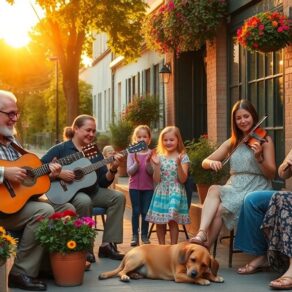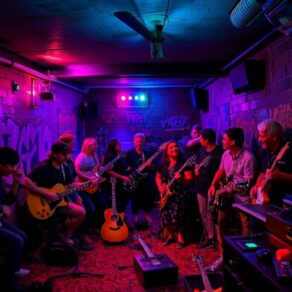Heartfelt tales from passionate musicians often reveal the profound connections between personal struggles and the healing power of music. You're not just listening to melodies; you're experiencing stories of resilience, friendship, and growth. Many musicians share how their craft helps them navigate challenges, transforming pain into relatable lyrics and enchanting performances. Community, mentorship, and collaboration enhance these experiences, forging strong ties among artists and audiences alike. Every note played carries a piece of their journey. If you explore further, you'll uncover more inspiring anecdotes that remind us of music's ability to unite and uplift the human spirit.
Key Takeaways
- Musicians often transform personal struggles into relatable lyrics, creating heartfelt connections with their audiences.
- Live performances serve as cathartic experiences, allowing both musicians and listeners to share emotional journeys.
- Collaborative songwriting brings together diverse perspectives, fostering friendships and deeper emotional understanding among artists.
- Community music initiatives enhance access to education, enabling passionate musicians to share their heartfelt stories and experiences.
- Mentorship relationships within music nurture personal growth, igniting passion and creativity in both mentors and aspiring musicians.
The Journey of a Flute Player

Every flute player sets out on a unique journey, shaped by their personal experiences and musical aspirations. As you immerse yourself in this world, you'll quickly discover the myriad flute techniques that define your path. Mastering breath control, finger positioning, and articulation becomes second nature, but the real magic lies in how these techniques allow you to express your creativity.
You're not just learning to play notes; you're finding your voice. Whether it's the delicate trill of a classical piece or the vibrant improvisation in jazz, each moment spent with your flute is a step toward deeper creative expression. The journey isn't merely about technical proficiency; it's about connecting with the music on a personal level.
In honing your flute techniques, you'll experience both breakthroughs and setbacks. These moments shape you, pushing you to explore different genres and styles. You'll find yourself drawn to the rich histories of various cultures, using the flute as a bridge to their stories. This exploration fosters a sense of belonging within a larger community of musicians who share your passion.
As you progress, you realize that your journey isn't just about the destination. It's about the friendships formed in practice rooms, the joy found in performance, and the shared experiences that resonate within you and others. Each note you play becomes a part of your narrative, demonstrating that, through the flute, you can express not just music, but your very essence. Additionally, developing strong breath control enhances your overall performance quality, allowing for greater musical expression.
Overcoming Challenges Through Music
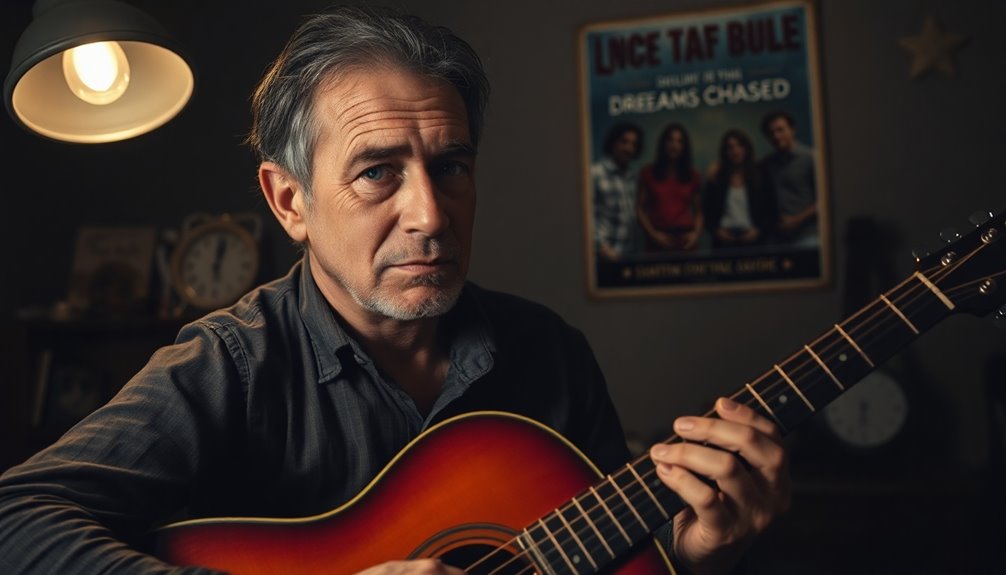
How do musicians turn personal struggles into powerful expressions of art? When faced with adversity, you might find that the act of creating music can serve as a lifeline. Musicians often harness their challenges, weaving them into melodies that resonate with their audience. The concept of musical resilience is central to this transformative process.
Here are four ways musicians channel their struggles into emotional expression:
- Personal Narratives: Musicians translate experiences—loss, heartbreak, or even joy—into lyrics that speak to the soul, allowing listeners to relate and find comfort in shared experiences.
- Innovative Soundscapes: By experimenting with different instruments and styles, musicians can articulate complex emotions. These unique soundscapes often reflect the turbulence of their journeys, inviting others to experience their stories.
- Collaborative Efforts: Working with fellow artists often enhances emotional expression. Collaborating provides a platform for musicians to support one another, fostering a sense of belonging while creating art that resonates with a wider audience.
- Live Performances: For many, performing live becomes a cathartic experience. Musicians can confront their challenges on stage, sharing vulnerability with their audience, creating a bond that transcends individual struggles. The effective teaching strategies used in music education, such as the Suzuki method, can further empower musicians in their journey.
Community Connections Through Flute
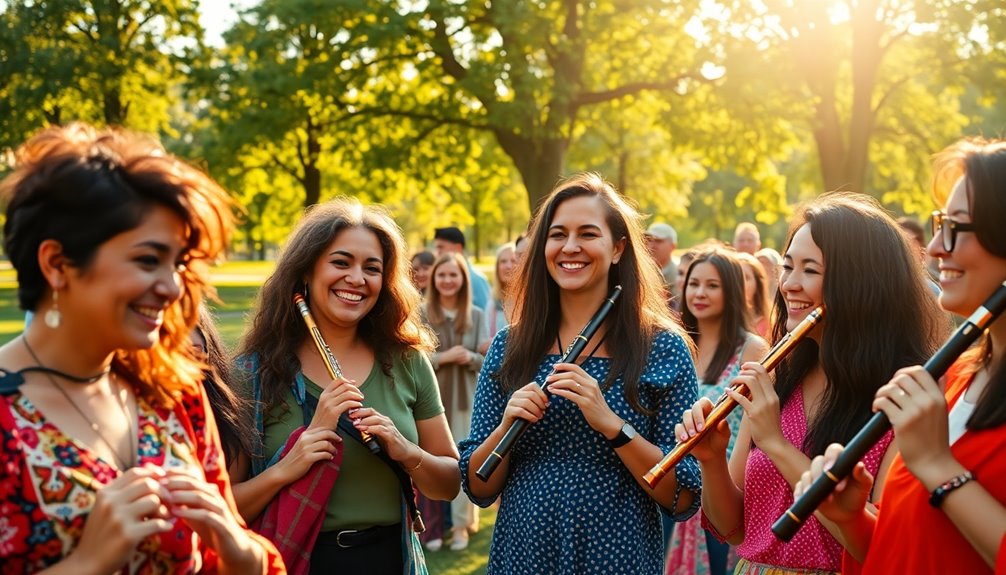
Musicians often find solace in their art, but the connections they forge with their communities can amplify that healing power even further. When you play the flute, you're not just making music; you're creating a bridge to those around you. Flute festivals and community outreach initiatives serve as vibrant platforms for this connection, allowing you to engage with fellow musicians and audiences alike.
Consider the impact of flute festivals. These gatherings aren't merely about performances; they're hubs of collaboration, learning, and shared passion. You'll find workshops where you can exchange techniques and ideas, fostering a sense of belonging. At community outreach events, your flute can carry messages of hope and unity, reaching those who may not have access to music education. Embracing these experiences can lead to greater personal growth and understanding of your musical journey.
Here's a quick overview of how flute music connects communities:
| Event Type | Community Impact | Personal Growth |
|---|---|---|
| Flute Festivals | Foster collaboration | Enhance skills |
| Community Outreach | Increase access to music | Build empathy and awareness |
| Workshops | Encourage mentorship | Boost confidence |
| Recitals | Celebrate local talent | Develop performance skills |
| Social Gatherings | Strengthen community bonds | Cultivate friendships |
Transformative Experiences With Performance

Performance can be a life-altering experience, offering insights that extend beyond the music itself. When you step onto that stage, you're not just sharing notes; you're inviting your audience into a shared emotional journey. This connection can lead to profound moments of transformation, both for you and for those who listen.
Here are four key aspects of how performance can change lives:
- Emotional Release: Each note you play or sing can express pent-up feelings, allowing you to convey what words often can't. This catharsis can lead to a deeper understanding of yourself.
- Audience Connection: The energy in the room is palpable. When you lock eyes with someone in the audience, you might find a sense of belonging that transcends the barriers of everyday life. They're feeling what you're feeling, creating an unspoken bond.
- Personal Growth: Facing an audience cultivates resilience. You learn to embrace vulnerability, which can enhance your confidence and foster a sense of community with fellow musicians and listeners.
- Inspiration: Your performance might spark something in others—a longing to create, to feel, or to connect. Knowing that your art has the power to inspire can be transformative for both you and your audience. Additionally, the intricate interplay of melodies in pieces like Carmen Fantasy can enrich this experience, emphasizing the importance of musical collaboration.
In these moments, performance becomes more than just a showcase of talent; it's a powerful act of connection and discovery, shaping who you're as a musician and as a person.
Mentorship and Growth in Music
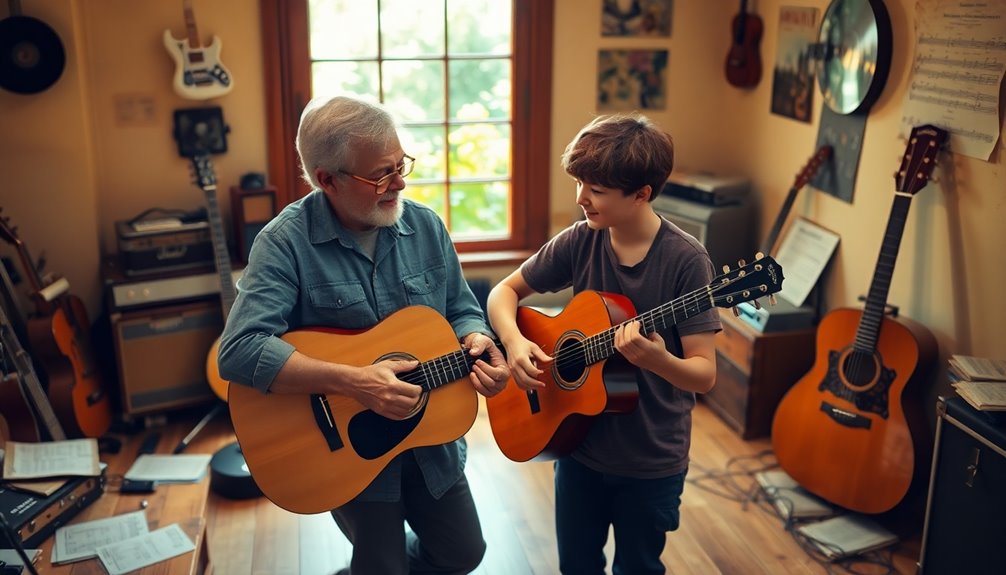
In the world of music, mentorship plays a crucial role in shaping the journey of aspiring artists. When you think about your growth as a musician, consider the immense benefits that come from having a mentor. They provide you with essential musical guidance, helping you navigate the complexities of your craft. Whether it's fine-tuning your technique or expanding your understanding of music theory, a mentor's insights can be invaluable.
Mentors don't just hand down knowledge; they inspire and challenge you to push your boundaries. Their experience allows them to identify areas where you can improve, facilitating skill enhancement that might feel out of reach when you're on your own. Through constructive feedback and encouragement, they nurture your potential and help you develop a unique musical voice.
Furthermore, mentorship fosters a sense of belonging within the music community. It connects you to a network of fellow artists, opening doors to collaborations and opportunities you may not have encountered otherwise. This sense of belonging can ignite your passion and motivate you to persist through challenges. Engaging with traditional flute melodies can also serve as a source of inspiration and enrich your artistic expression.
As you begin your musical journey, remember that mentorship is a two-way street. Be open to learning, but also share your own experiences and insights. This reciprocal relationship enriches both you and your mentor, creating a vibrant atmosphere for growth.
Embrace mentorship, and you'll discover that your evolution as a musician isn't just about skill—but about the relationships you build along the way.
The Role of Music in Healing
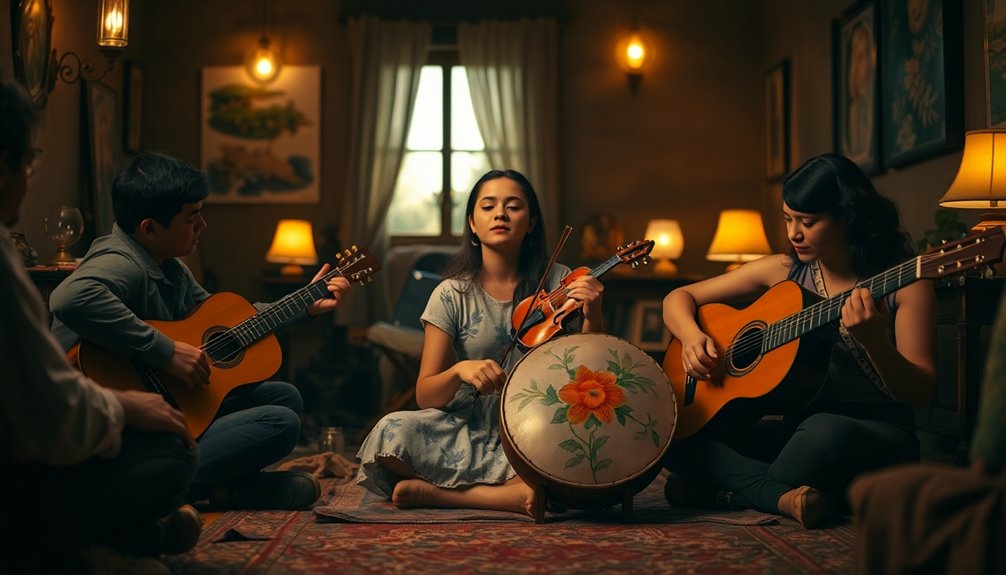
Many people underestimate the profound impact music can have on emotional and physical healing. The power of music therapy has been increasingly recognized as an essential tool for those seeking solace and recovery. It enables emotional expression that transcends spoken words, often reaching the depths of our feelings where language fails.
Consider these four significant ways music aids in healing:
- Emotional Release: Engaging with music allows you to channel feelings, helping to process complex emotions such as grief, anxiety, or anger. Singing or playing an instrument can be cathartic, providing a safe space for expression.
- Stress Reduction: Listening to calming music can lower cortisol levels in your body, reducing stress and promoting relaxation. This can be especially beneficial in times of crisis or after traumatic experiences.
- Pain Management: Research shows that music can help alleviate pain. Hospitals often use music therapy to help patients manage discomfort, making recovery more bearable.
- Community Connection: Music creates a sense of belonging. Participating in group music sessions fosters connections with others, alleviating feelings of isolation and enhancing mental well-being.
As you explore the healing properties of music, remember that everyone's journey is unique. Articulation techniques can enhance your musical expression, making the experience even more impactful.
Whether you're strumming a guitar, singing along to your favorite songs, or simply listening, you're tapping into a timeless source of comfort and understanding.
Embrace this powerful tool for healing, and let the music guide you.
Celebrating Cultural Heritage With Flute

Flute music serves as a vibrant thread woven into the tapestry of cultural heritage across the globe. When you listen carefully, you'll notice how flute traditions resonate with the cultural rhythms of various communities. Each note carries stories, embodying the essence of a people's history, struggles, and triumphs. As you explore these traditions, you're not just hearing melodies; you're experiencing a shared identity that binds generations together.
From the haunting sounds of the Andean pan flute to the delicate tones of the Indian bansuri, each culture uses the flute to express its unique voice. You might find that these instruments often accompany significant rituals, celebrations, and communal gatherings, emphasizing their role in fostering connection. You're tapping into an age-old practice that transcends language, creating a sense of belonging among those who share in the music.
Engaging with flute music invites you to celebrate cultural heritage actively. You can participate by learning traditional songs or even by attending workshops where you can immerse yourself in the rhythms that define a community's spirit. The choice of high-quality woods like cedar in crafting these flutes enhances their sound and durability, adding depth to the musical experience.
When you pick up a flute, you're not only embracing an instrument; you're honoring the voices of those who came before you. This celebration of cultural heritage through flute music enriches your understanding of the world and helps cultivate a sense of unity among diverse cultures.
Stories of Collaboration and Friendship
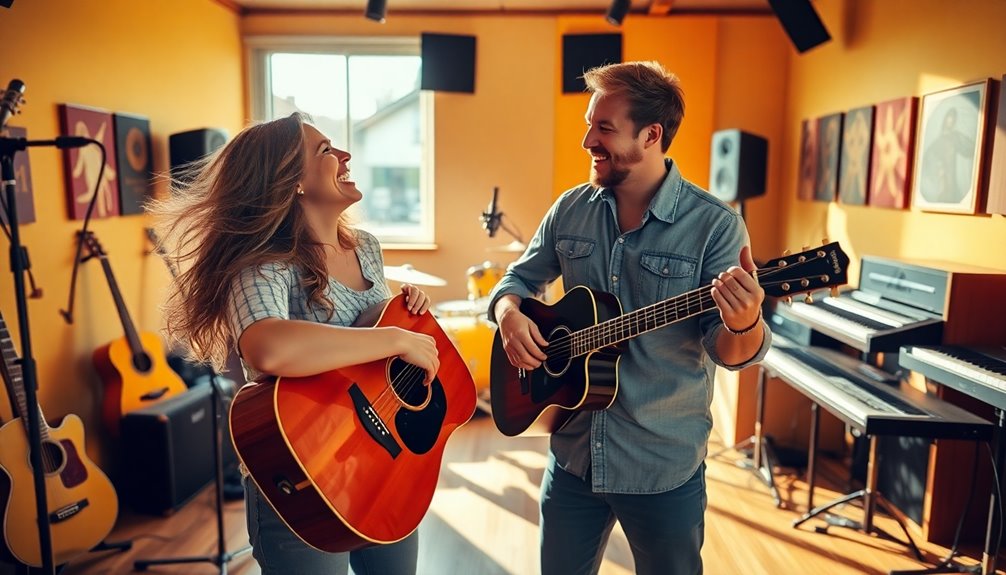
Through the power of music, stories of collaboration and friendship come to life, revealing the profound connections forged between artists. You can see how collaborative creativity not only enhances the music but also strengthens the bonds of friendship.
Each collaboration offers a unique dynamic, allowing musicians to explore each other's strengths and vulnerabilities. Here are four examples that illustrate this beautiful synergy:
- Writing Together: When two songwriters collaborate, they often blend their perspectives, creating lyrics that resonate with a wider audience. This process deepens their friendship as they learn to trust each other's instincts.
- Cross-Genre Collaborations: Collaborating across genres can lead to unexpected sounds and new ideas. A jazz musician working with a rock guitarist might discover innovative ways to express emotions, enriching both their musical journeys.
- Live Performances: Sharing the stage fosters a sense of camaraderie. The adrenaline rush of performing together can solidify friendships as artists support each other during their most vulnerable moments.
- Support Networks: Musicians often form tight-knit groups, providing encouragement during tough times. These friendships can lead to lifelong bonds, creating a sense of belonging in a sometimes isolating industry.
Through these interactions, you can see how friendship dynamics evolve, enriching the artistic process and deepening connections. Moreover, participating in a flute ensemble cultivates teamwork and communication, further enhancing the collaborative experience.
In the world of music, collaboration isn't just about the notes played; it's about the relationships built along the way.
The Joy of Teaching and Sharing
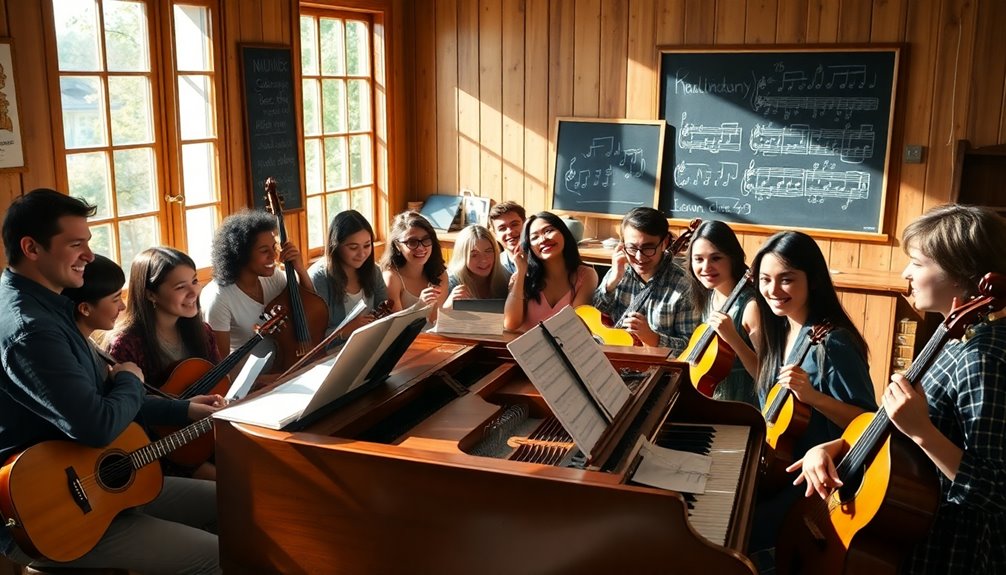
The joy of teaching and sharing music extends beyond imparting knowledge; it fosters a sense of community and connection. When you step into the role of a music teacher, you're not just guiding students through scales or rhythms; you're creating a space where they can express themselves and belong.
The teaching techniques you employ can greatly impact student engagement. For instance, incorporating interactive elements—like group performances or improvisation—can spark creativity and deepen their understanding of music.
As you share your passion, you'll notice that students often mirror your enthusiasm. They thrive in an environment where they feel supported and encouraged. By fostering a culture of collaboration, you help them develop not only as musicians but as individuals. This mutual exchange transforms the learning experience into a shared journey, where every note played becomes a part of a greater narrative.
Moreover, teaching music cultivates a sense of responsibility. When students share their newfound skills with others, they contribute to the musical tapestry of their community. They learn that their talents can uplift those around them, reinforcing the idea that music is a universal language. Incorporating tools like moisture control solutions can enhance their performance and comfort while playing, promoting a richer learning experience.
Ultimately, the joy of teaching lies in witnessing your students grow, both musically and personally. Every lesson you impart plants a seed of inspiration. Through your guidance, they'll discover their unique voice, and in doing so, you'll find a profound connection that transcends the classroom.
It's this shared journey that truly embodies the heart of music education.
Frequently Asked Questions
What Inspired You to Start Playing the Flute?
You might find that your childhood memories play an essential role in your inspiration to pick up the flute.
Perhaps you were influenced by a family member's musical talent or a favorite song that sparked your interest. Those early musical influences can create a deep connection, pushing you to express yourself through the instrument.
The joy of creating melodies can transform your experiences into something profound, fostering a sense of belonging in the musical community.
How Do You Choose Your Musical Repertoire?
Choosing your musical repertoire isn't just about personal preference; it's about embracing the diversity of your musical influences.
You might think sticking to one genre is easier, but exploring various styles enriches your playing and connects you with a broader audience.
Consider what resonates with you emotionally and what challenges you. This way, you'll create a vivid tapestry of sound that reflects your journey and invites others to share in your musical experience.
What Advice Do You Have for Beginner Flute Players?
If you're starting on the flute, focus on solid flute technique tips.
Begin with long tones to build your sound quality and breath control. Establish a daily practice routine, even if it's just 15 minutes.
Break down challenging pieces into smaller sections to master them more effectively. Don't hesitate to seek feedback from peers or instructors; it's an essential part of your growth.
How Do You Cope With Performance Anxiety?
Coping with performance anxiety can be challenging, but you've got effective strategies. Start by practicing breathing techniques; deep, slow breaths can calm your nerves.
Pair this with mental visualization: picture yourself performing confidently and successfully. Imagine the audience's positive reactions, which can help build your self-assurance.
What Are Your Favorite Flute Brands or Models?
Did you know that over 70% of professional flutists prefer specific brands for their sound quality?
When it comes to your favorite flute brands or models, consider Yamaha for its reliability or Powell for its rich tone.
Don't forget to follow flute maintenance tips like regular cleaning and proper storage.
Also, invest in favorite flute accessories, such as a quality case or a cleaning rod, to enhance your playing experience and guarantee longevity.
Conclusion
As you reflect on these heartfelt tales, you can't help but feel the vibrant pulse of music weaving through lives. Each story, a gentle reminder of how melodies can mend, connect, and celebrate our shared humanity. The flute, a humble companion, becomes a bridge between hearts, nurturing friendships and igniting passions. So, whether you're a performer or a listener, embrace the transformative power of music—it's truly a magical journey worth taking.


